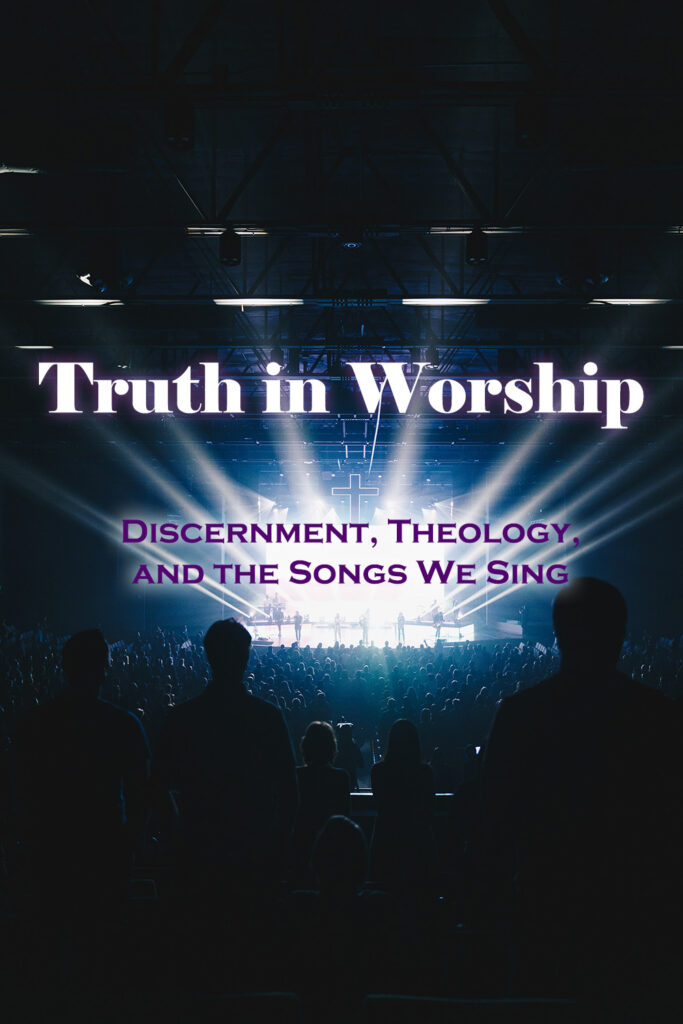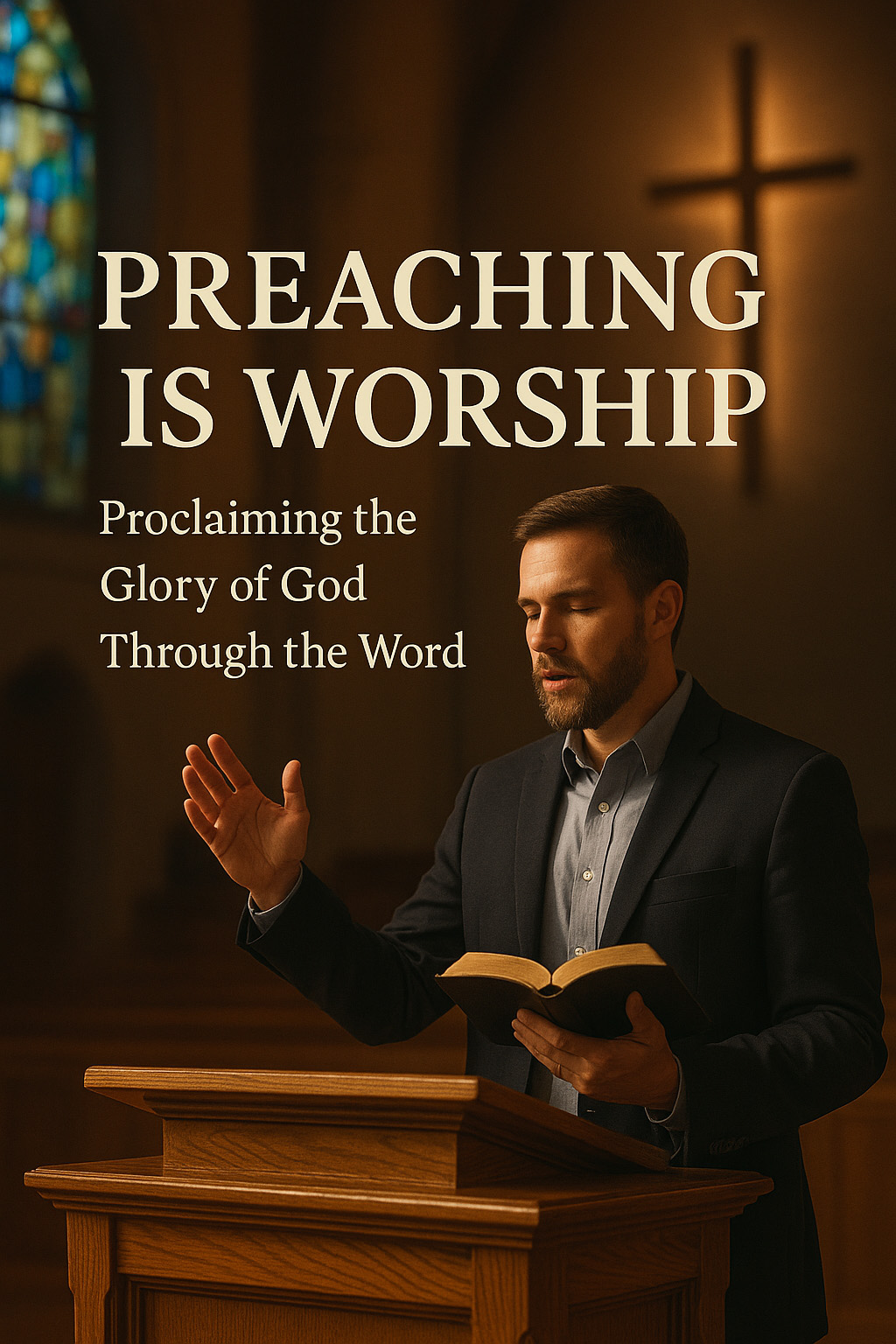⏱️ Estimated Reading Time: 7 min read
Preaching is Worship: Proclaiming the Glory of God Through the Word
By David De Bruyn
Worship is knowing and expressing God’s worth. Worship is treasuring, valuing, and loving God according to what we think is “due His name” (Psalm 29:2). For God to be praised, admired, and treasured, His glory must be perceived. For Him to be perceived, He must reveal Himself. God reveals Himself in the Scriptures. Preaching is declaring His Word. Therefore, preaching is worship because it unveils God. It tells us who God is in Christ: what He is like, what He expects, what He is doing, what He desires, what He has done and shall do.
God’s Word is His declaration of Himself. So, when God’s Word is central in a corporate worship service, God’s glory is sure to be seen, admired, and cherished. In fact, what has always set God’s people apart has been His written Word. When Israel came out of Egypt, what differentiated them from the nations was the Law. The Law revealed Jehovah, noting else.
This is why preaching ought to be at the center of corporate worship. A read through First Timothy, which was given so believers “may know how you ought to conduct yourself in the house of God” (1 Timothy 3:15) shows us just how central preaching is to be (1:3; 4:6, 11, 13-16; 6:20). Second Timothy continues the theme of the centrality of sound doctrine through sound teaching and preaching (2 Timothy 1:6; 13-14; 2:2, 15-16, 22-24; 4:1-2)
Picture a meeting of gem collectors. As in any meeting, we might imagine all kinds of things: old friendships renewed, some discussion on recent news that would be of interest gem collectors, perhaps some time given to one or two gem collectors telling others about their recent finds. But what would be the main event of their meeting? Surely, it would be displaying the gems: bringing out the rubies, emeralds, sapphires, tanzanites, topazes, opals, diamonds – holding them up to the light, letting the light pass through them and reflect off them, letting them sparkle and show off their brilliance. As this is done, the gem collectors would admire, praise, and delight in those jewels.
Corporate worship similarly has many aspects: fellowship, mutual encouragement, edifying of each other, giving, and serving one another. But the main aspect of worship is when the preacher takes the treasure box of the Bible and shows forth the precious glory of God, holding it up so it sparkles and people see the brilliance, beauty, and value of God. As a result, there will be right reactions of praise, blessing, admiration, and honour. People are captivated, enthralled, thankful, challenged, and convicted. The preacher is worshipping over the Word as he exults in the truth that he has experienced in his own heart, and the receptive people glory in seeing it as well. God’s people encounter Him as He speaks.
But this assumes that a particular kind of preaching is taking place. Not just any preaching will do. I have, at times, heard people say of a particular man, “What a blessed speaker!”, “What tremendous preaching!” And on occasion, I have thought to myself, the man was indeed interesting, dynamic, or eloquent, but it wasn’t good preaching. Indeed, the most dangerous false teachers are seldom boring speakers. But their popularity doesn’t add up to true preaching.
Good preaching is not good merely because the speaker has the ability to hold the audience’s attention. Good preaching is not good simply because the speaker is witty, clever, or charming. Again, this might be skill or natural talent on his part, but this alone does not make for good preaching.
In Nehemiah 8:10, we have on Old Testament example of true preaching, which brings about worship. “So they read distinctly from the book, in the Law of God; and they gave the sense, and helped them to understand the reading.” Three characteristics of true, worship-inspiring preaching are readily noticeable.
One: The Scripture is Read Clearly (“They Read Distinctly from the Book”)
The Word of God is read in a way that all who hear can understand clearly what is being said. The reason for reading the Scripture distinctly is because we plan to unpack it carefully. True preaching aims to examine carefully what God has said. And the starting place is a careful reading of God’s Word.
Reading the Scripture publicly is commanded in several places in the New Testament (1 Timothy 4:13; 1 Thessalonians 5:27; Colossians 4:16). Reading the Scriptures publicly does not mean that a Scripture is merely referenced in passing, and then the preacher goes off on a tangent. That is known as springboard preaching. This is where a preacher takes you to a text, ostensibly to preach from it. But after reading it, he actually simply uses the words or some of the words to launch off, to speak about what he has already decided to speak on. The Scripture is read to provide the authority and basis of the sermon.
Two: The Meaning of the Text is Explained (“They Gave the Sense”)
Sometimes God’s Word is plain enough to do its work without any explanation. Most times, it needs to be explained. It must be taught. When true preaching takes place, someone is used by God to unfold the meaning.
The faithful preacher does not invent meanings. He does not attach meanings which he wishes to preach. He does not find allegorical meanings to seem clever. This is the opposite of exposition. Imposing upon the Bible our own ideas on a text and then act as if that text teaches it is eisegesis, not exegesis. Eisegesis is putting ideas into a text, instead of extracting them.
Simply put, true preaching is when what God has said is allowed to speak for itself. The preacher does not use the Word to his own ends, but is a servant to the Word. He unfolds it, unpacks it, lays it out, organises it, and structures it. Scripture is not a servant to the preacher, like source material for a comedian or a historian. No, the preacher is a servant to the Scripture—letting it speak.
The preacher is a bridge between God’s Word and the people. This is true preaching. When the preacher is finished, the people forget about the preacher. They can walk away and say, “This is what God said in His Word, and I understand what He meant.”
Three: The Listeners Understand and Respond (“Helped Them to Understand the Reading”)
The teaching of Ezra and his assistants helped the people to understand the reading. Notice, there was more than a mental understanding. The people were moved in their affections: “And Nehemiah, who was the governor, Ezra the priest and scribe, and the Levites who taught the people said to all the people, “This day is holy to the Lord your God; do not mourn nor weep.” For all the people wept, when they heard the words of the Law.” (Nehemiah 8:9)
When the Word came, the people were pliable and yielded to it. They were gripped by God’s glory, gripped by their own sense of failure, gripped by remorse and conviction. True preaching does not just tickle the mind, it stirs the heart. The affections are raised. Whether it be joy, delight, admiration, awe, fear, sorrow, confidence, thanksgiving, changed affections demonstrate an understanding, which penetrates the soul. It goes beyond head-knowledge and engages the emotions and in turn causes a response of the will. When true preaching has taken place, people see their God and respond to Him.
Preaching is reaching its highest place when people almost forget about the preacher and are captivated, enthralled, and convicted by the glory of the God in the face of Jesus shining through the Word.
That’s what true preaching is, and that is why preaching is worship. The responsibility of the preacher is to bring across what God has said about Himself with the clarity and authority with which God has said it, so that God’s people might respond to Him.

Truth in Worship: Discernment, Theology, and the Songs We Sing
David de Bruyn was born in Johannesburg, South Africa, where he now pastors New Covenant Baptist Church and resides with his wife and three children. He is a graduate of Central Baptist Theological Seminary in Minnesota and the University of South Africa (D.Th.). David hosts a weekly radio program that is heard throughout much of central South Africa, serves as a frequent conference speaker, and is a lecturer at Shepherds Seminary Africa. Check out his website.




